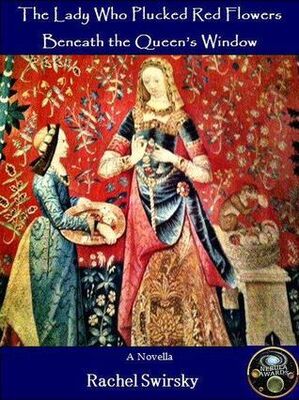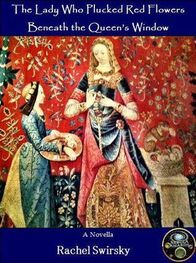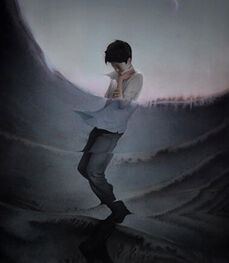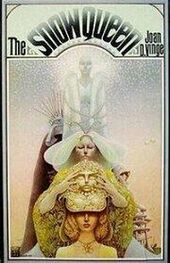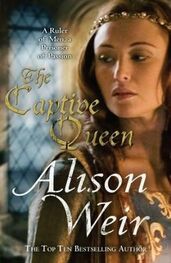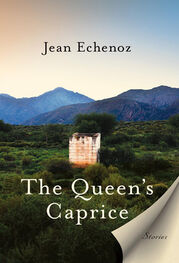I no longer had dialogues or magic or sex to occupy my time. I had only remote, distracted Misa. My world began to shape itself around her—my love for her, my concern for her, my dread that she wouldn’t find a cure, and my fear of what I’d do if she didn’t. She was weak, and she was leading me into weakness. My mind sketched patterns I didn’t want to imagine. I heard the spirits in The Desert Which Should Not Have Been whispering about the deaths of civilizations, and about choices between honor and love.
Misa stopped sleeping. Instead, she sat on the bed in the dark, staring into the shadows and worrying her hands.
“There is no cure,” she muttered.
I lay behind her, watching her silhouette.
“Of course there’s a cure.”
“Oh, of course,” snapped Misa. “We’re just too ignorant to find it!”
Such irrational anger. I never learned how to respond to a lover so easily swayed by her emotions.
“I did not say that you were ignorant.”
“As long as you didn’t say it.”
Misa pulled to her feet and began pacing, footsteps thumping against the piled rugs.
I realized that in all my worrying, I’d never paused to consider where the plague had been, whether it had ravaged the communities where Misa had lived and loved. My people would have thought it a weakness to let such things affect them.
“Perhaps you are ignorant,” I said. “Maybe you can’t cure this plague by building little boxes. Have you thought of that?”
I expected Misa to look angry, but instead she turned back with an expression of awe. “Maybe that’s it,” she said slowly. “Maybe we need your kind of magic. Maybe we need poetry.”
For the first time since the plague began, the lines of tension began to smooth from Misa’s face. I loved her. I wanted to see her calm and curious, restored to the woman who marveled at new things and spent her nights beside me.
So I did what I knew I should not. I sat with her for the next hours and listened as she described the affliction. It had begun in a swamp far to the east, she said, in a humid tangle of roots and branches where a thousand sharp and biting things lurked beneath the water. It traveled west with summer’s heat, sickening children and old people first, and then striking the young and healthy. The children and elderly sometimes recovered. The young and healthy never survived.
I thought back to diseases I’d known in my youth. A very different illness came to mind, a disease cast by a would-be usurper during my girlhood. It came to the Land of Flowered Hills with the winter wind and froze its victims into statues that would not shatter with blows or melt with heat. For years after Rayneh’s mother killed the usurper and halted the disease, the Land of Flowered Hills was haunted by the glacial, ghostly remains of those once-loved. The Queen’s sorceresses sought them out one by one and melted them with memories of passion. It was said that the survivors wept and cursed as their loved ones melted away, for they had grown to love the ever-present, icy memorials.
That illness was unlike what afflicted Misa’s people in all ways but one—that disease, too, had spared the feeble and taken the strong.
I told Misa, “This is a plague that steals its victims’ strength and uses it to kill them.”
Misa’s breaths came slowly and heavily. “Yes, that’s it,” she said. “That’s what’s happening.”
“The victims must steal their strength back from the disease. They must cast their own cures.”
“They must cast your kind of spells. Poetry spells.”
“Yes,” I said. “Poetry spells.”
Misa’s eyes closed as if she wanted to weep with relief. She looked so tired and frail. I wanted to lay her down on the bed and stroke her cheeks until she fell asleep.
Misa’s shoulders shook but she didn’t cry. Instead, she straightened her spectacles and plucked at her robes.
“With a bit of heat and… how would obsidian translate into poetry?…” she mused aloud. She started toward the ladder and then paused to look back. “Will you come help me, Naeva?”
She must have known what I would say.
“I’ll come,” I said quietly, “but this is woman’s magic. It is not for men.”
What followed was inevitable: the shudder that passed through Misa as her optimism turned ashen. “No. Naeva. You wouldn’t let people die.”
But I would. And she should have known that. If she knew me at all.
She brought it before the council. She said that was how things were to be decided. By discussion. By consensus.
We entered through the western arch, the arch of conflict. The scholars arrayed on their raised couches looked as haggard as Misa. Some seats were empty, others filled by men and women I’d not seen before.
“Why is this a problem?” asked one of the new scholars, an old woman whose face and breasts were stippled with tiny, fanged mouths. “Teach the spell to women. Have them cast it on the men.”
“The victims must cast it themselves,” Misa said.
The old woman scoffed. “Since when does a spell care who casts it?”
“It’s old magic,” Misa said. “Poetry magic.”
“Then what is it like?” asked a voice from behind us.
We turned to see the narrow man with the fine, sensory hairs, who had demanded at my prior interrogation whether knowledge gained through bigotry was worth preserving. He lowered his gaze onto my face and his hairs extended toward me, rippling and seeking.
“Some of us have not had the opportunity to learn for ourselves,” he added.
I hoped that Misa would intercede with an explanation, but she held her gaze away from mine. Her mouth was tight and narrow.
The man spoke again. “Unless you feel that it would violate your ethics to even describe the issue in my presence.”
“No. It would not.” I paused to prepare my words. “As I understand it, your people’s magic imprisons spells in clever constructions. You alter the shape and texture of the spell as you alter the shape and texture of its casing.”
Dissenting murmurs rose from the councilors.
“I realize that’s an elementary description,” I said. “However, it will suffice for contrast. My people attempted to court spells with poetry, using image and symbol and allusion as our tools. Your people give magic a place to dwell. Mine woo it to tryst awhile.”
“What does that,” interjected the many-mouthed old woman, “have to do with victims casting their own spells?”
Before I could answer, the narrow man spoke. “It must be poetry—the symmetry, if you will. Body and disease are battling for the body’s strength. The body itself must win the battle.”
“Is that so?” the old woman demanded of me.
I inclined my head in assent.
A woman dressed in robes of scarlet hair looked to Misa. “You’re confident this will work?”
Misa’s voice was strained and quiet. “I am.”
The woman turned to regard me, scarlet tresses parting over her chest to reveal frog-like skin that glistened with damp. “You will not be moved? You won’t relinquish the spell?”
I said, “No.”
“Even if we promise to give it only to the women, and let the men die?”
I looked toward Misa. I knew what her people believed. The council might bend in matters of knowledge, but it would not bend in matters of life.
“I do not believe you would keep such promises.”
The frog-skinned woman laughed. The inside of her mouth glittered like a cavern filled with crystals. “You’re right, of course. We wouldn’t.” She looked to her fellow councilors. “I see no other option. I propose an Obligation.”
“No,” said Misa.
“I agree with Jian,” said a fat scholar in red and yellow. “An Obligation.”
Читать дальше